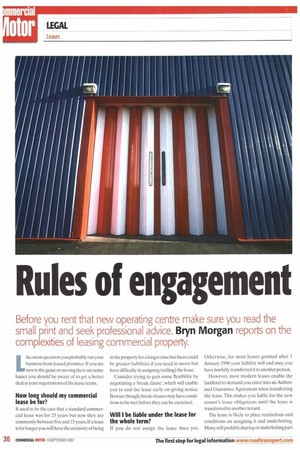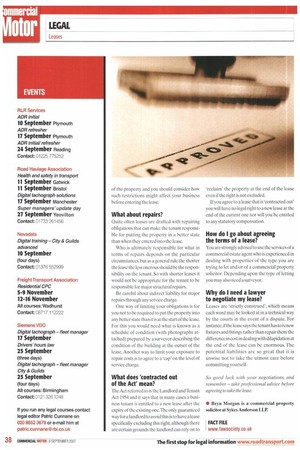Rules of engagement
Page 36

Page 38

If you've noticed an error in this article please click here to report it so we can fix it.
Before you rent that new operating centre make sure you read the small print and seek professional advice. Bryn Morgan reports on the complexities of leasing commercial property.
ILike most operators you probably run your business from leased premises. If you are new to the game or movingthere are some basics you should be aware of to get a better deal in your negotiations of the lease terms.
How long should my commercial lease be for?
It used to be the case that a standard commercial lease was for 25 years but now they are commonly between five and 15 years. If a lease is for longer you will have the certainty of being in the property for a longer time but there could be greater liabilities if you need to move but have difficulty in assigning (selling) the lease.
Consider trying to gain some flexibility by negotiating a 'break clause', which will enable you to end the lease early on giving notice. Beware though; break clauses may have conditions to be met before they can be exercised.
Will I be liable under the lease for the whole term?
If you do not assign the lease then yes. Otherwise, for most leases granted after I _January 1996 your liability will end once you have lawfully transferred it to another person.
However, most modern leases enable the landlord to demand you enter into an Authorised Guarantee Agreement when transferring the lease. This makes you liable for the new tenant's lease obligations until the lease is transferred to another tenant.
The lease is likely to place restrictions and conditions on assigning it and underletting. Many will prohibit sharing or underletting part of the property and you should consider how such restrictions might affect your business before entering the lease.
What about repairs?
Quite often leases are drafted with repairing obligations that can make the tenant responsible for putting the property in a better state than when they entered into the lease.
Who is ultimately responsible for what in terms of repairs depends on the particular circumstances, but as a general rule the shorter the lease the less onerous should be the responsibility on the tenant. So with shorter leases it would not be appropriate for the tenant to be responsible for major structural repairs.
Be careful about indirect liability for major repairs through any service charge.
One way of limiting your obligations is for you not lobe required to put the property into any better state than it is at the start of the lease. For this you would need what is known as a schedule of condition (with photographs attached) prepared by a surveyor describing the condition of the building at the outset of the lease, Another way to limit your exposure to repair costs is to agree to a 'cap' on the level of service charge.
What does 'contracted out of the Act' mean?
The Act referred to is the Landlord and Tenant Act 1954 and it says that in many cases a business tenant is entitled to a new lease after the expiry of the existing one.The only guaranteed way for a landlord to avoid this is to have a lease specifically excluding this right, although there are certain grounds the landlord can rely on to -reclaim' the property at the end of the lease even if the right is not excluded.
If you agree to a lease that is 'contracted out' you will have no legal right to a new lease at the end of the current one nor will you be entitled to any statutory compensation.
How do I go about agreeing the terms of a lease?
You are strongly advised Louse the services of a commercial estate agent who is experienced in dealing with properties of the type you are trying to let and/or of a commercial property solicitor. Depending upon the type of letting you may also need a surveyor.
Why do I need a lawyer to negotiate my lease?
Leases are 'strictly construed', which means each word may be looked at in a technical way by the courts in the event of a dispute. For instance, if the lease says the tenant has to renew fixtures and fittings rather than repair them the difference in cost in dealing with dilapidation at the end of the lease can be enormous. The potential liabilities are so great that it is unwise not to take the utmost care before committing yourself.
So good luck with your negotiations, and remember — take professional advice before agreeing to take the lease.
































































































































































































